Top 11 Squarespace Alternatives of 2026
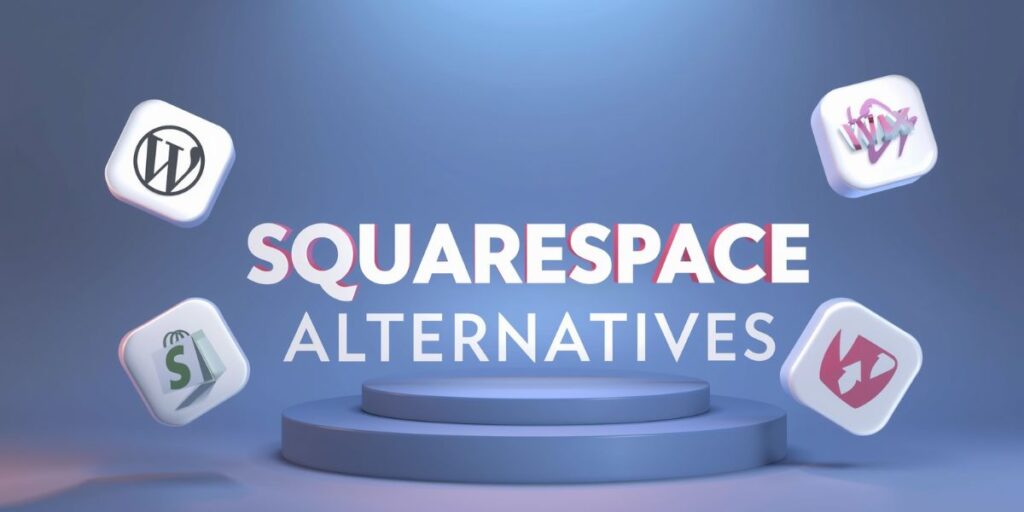
Squarespace has become one of the most popular website builders. It is due to its clean templates and all-in-one approach. Many small businesses, creatives, and entrepreneurs rely on an online presence from their portfolios to their e-commerce stores.
But here is the thing: Squarespace is not for everyone. Some users don’t find it ideal as per their needs, some find it restrictive, and others find it expensive. And with growing business demands, users are looking for better website builders.
The good news? In 2026, there are a number of excellent Squarespace alternatives that offer a number of features and customisation, suited for various business needs. In this blog, we will explore the ten best alternatives to Squarespace, their strengths, weaknesses, and the type of users they are best suited for.
Why Look for Squarespace Alternatives?
Squarespace is certainly a good-looking website, and not every person should use it. You can also discover that other platforms are better suited to your intentions. The following are some of the primary reasons why people look into Squarespace alternatives:
- Pricing Issues: The plans offered by Squarespace may be costly, particularly to freelancers, hobbyists, or small enterprises just starting out. Other options offer the same features at a cheaper price.
- Lack of Customisation: The templates will appear professional, but there are not a lot of options when it comes to customisation unless you are comfortable with CSS or other advanced coding updates.
- eCommerce shortcomings: Squarespace is a good solution for a small online store, but does not have the intensive inventory, multi-channel sales or scalability of other platforms such as Shopify or BigCommerce.
- Performance Problems: There are users who have observed delays in loading as compared to lightweight builders or provision on optimised platforms. The speed of the website can have a direct impact on SEO and user experience.
- Fewer Integrations: Squarespace has fewer integrations compared to WordPress, which has thousands of WordPress plug-ins or Shopify, which has a large market of apps.
- Scalability Issues: Ideal in the case of personal websites and small-to-medium projects, it might not be able to keep pace with the requirements of rapidly expanding businesses.
Key Features to Consider in Squarespace Alternatives
When selecting a Squarespace alternative, one should be aware of what counts in a site builder. What is the right option? It depends on your objectives: whether it is to blog, have an online store, or demonstrate a portfolio. The main characteristics to be found here are:
- Usability: A draggable editor or a user-friendly dashboard can save time, particularly when you are not technical.
- Design Flexibility: Seek a broad collection of templates, themes, and customisation choices that allow you to build a site that reflects your own unique brand.
- Pricing & Plans: Low prices and open pricing are needed. You should consider whether you will have the features you require in the plan.
- eCommerce Tools: In the case of selling products or services, it is important to ensure that you have access to features such as payment gateways, inventory management, shipping options, and tax settings.
- Support: SEO Support, Blog Support, Email Marketing and integrations with programs like Google Analytics or Mailchimp to grow the site needs strong SEO, Blog, Email Marketing, and integrations.
- Integrations & Plugins: It allows you to integrate with third-party tools (CRM, email, social media, payment apps) to add functionality to your site.
- Scalability: Your site must be scalable to your business. Select a platform that will be capable of supporting traffic, products and advanced features as time goes by.
- Customer Support: Customer Support, Tutorials and Forums are a priceless asset in case of problems.
Comparison Table
| Top 11 Squarespace alternatives in 2026 | |||
| Tool | Best for | Ease of use | Pricing |
| Brizy | SaaS businesses, freelancers, marketers | Very easy (AI-assisted) | Free plan available; Brizy Cloud from ~$19/mo or WordPress PRO from ~$60/yr |
| Wix | Beginners, small businesses, creatives | Very easy | Free plan; Paid from $16/mo |
| WordPress.org | Bloggers, businesses, and advanced users | Moderate (needs hosting setup) | Free; Hosting $3–$10/mo |
| Shopify | Online store owners, eCommerce brands | Easy (store-focused setup) | From $39/mo |
| Webflow | Designers, freelancers, agencies | Moderate (learning curve) | Free plan; Paid from $18/mo |
| Weebly | Beginners, budget users | Very easy | Free plan; Paid from $10/mo |
| GoDaddy Website Builder | Small businesses, quick setup users | Very easy (AI-driven setup) | From $10.99/mo |
| Zyro (by Hostinger) | Freelancers, personal sites, budget users | Easy | From $2.90/mo |
| Duda | Agencies, freelancers, teams | Easy | From $19/mo |
| BigCommerce | Medium to large eCommerce businesses | Moderate (more setup needed) | From $29.95/mo |
| Ghost | Bloggers, writers, content creators | Easy (focused on writing) | From $11/mo (self-host free) |
11 Best Squarespace Alternatives in 2026
1. Brizy
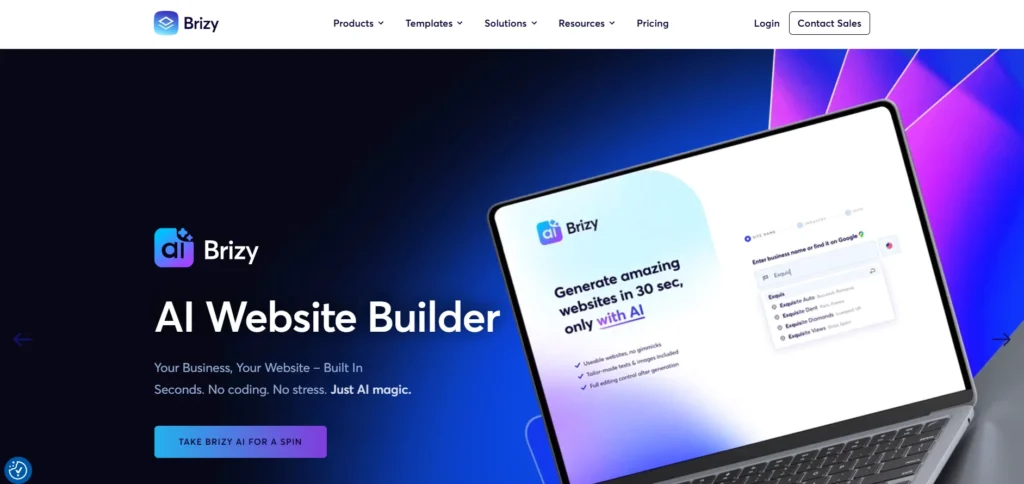
Brizy is a modern AI-powered website builder that enables users to create professional websites quickly without writing any code. It combines an intuitive drag-and-drop editor with AI site generation, helping you launch pages or full sites in minutes – ideal for small businesses, freelancers, and marketers who want creative control without technical complexity. Brizy is available as both a cloud-hosted platform (Brizy Cloud) and a WordPress plugin, giving you flexibility in how you build and host your site.
Brizy Cloud includes hosting, AI site creation, templates, and built-in marketing features, while the WordPress version integrates with your own hosting and WordPress ecosystem. Brizy’s AI builder can generate complete websites based on minimal input, making it especially appealing compared to Squarespace for users who want speed plus customization.
Key Features:
- AI-powered website generation.
- Visual drag-and-drop editor with real-time editing.
- Pre-designed templates and blocks.
- Hosting included with Brizy Cloud.
- Works as a WordPress plugin for self-hosted sites.
Pros:
- Fast, beginner-friendly site creation.
- More design flexibility than Squarespace.
- Two platform options: Cloud or WordPress.
Cons:
- Smaller ecosystem and fewer third-party integrations than some competitors.
- Premium features and AI capabilities require paid plans.
Pricing: Brizy offers a free tier; Brizy Cloud paid plans start around ~$19/month for personal use, with higher tiers for agencies and white-label features. The WordPress plugin has its own yearly PRO plans.
Best For: SaaS businesses, freelancers, and marketers who want AI-assisted website creation with easy visual editing.
2. Wix

Wix is among the most popular all over the world, with its flexibility and easy use of their website builders. The user-friendly drag-and-drop designer enables any user to create completely custom websites without a single line of code. It also has hundreds of contemporary templates, a large marketplace of apps, and includes SEO, blogging, and eCommerce tools. Whether you need to create a personal blog, portfolio or a business online store, Wix gives you the artistic freedom that many customers cannot afford in Squarespace.
Key Features:
- 800+ customizable templates.
- Drag-and-drop editor with full design freedom.
- Wix App Market for extra functionality.
- Built-in SEO and marketing tools.
- eCommerce and blogging support.
Pros:
- Extremely beginner-friendly.
- Wide range of templates and design flexibility.
- Strong app ecosystem for added features.
Cons:
- It can feel overwhelming due to too many options.
- Performance issues on complex sites.
Pricing: Free plan available; Paid plans start at around $16/month.
Best For: Beginners, small businesses, and creatives who want full design freedom.
3. WordPress.org
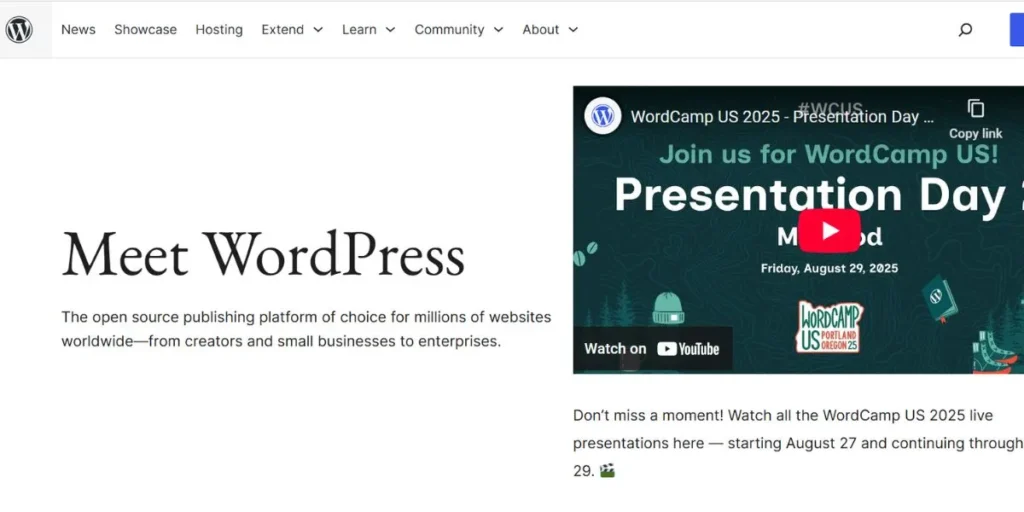
WordPress.org is the most popular CMS in the world, with more than 40 per cent of all websites on the planet using it. It is also completely open-source, which, unlike Squarespace alternatives, gives you unlimited customisation with themes, no matter the number of pages, plus the ability to write your own code. Bloggers, content creators, and businesses with advanced functionality are particularly popular with it. Under WordPress, you are the owner of your website and your possibilities in scaling, whether it is a simple blog or an enterprise website, are unlimited.
Key Features:
- Thousands of free and premium themes.
- 60,000+ plugins for customization.
- Full control over hosting and website.
- Great for blogs, business sites, and eCommerce (with WooCommerce).
- Large community support.
Pros:
- Unlimited flexibility and scalability.
- Huge plugin/theme ecosystem.
- Ideal for blogging and SEO.
Cons:
- Requires more technical knowledge than Squarespace.
- Hosting, security, and maintenance are your responsibility.
Pricing: Free to use; Hosting costs start at $3–$10/month.
Best For: Bloggers, businesses, and advanced users who want full control and scalability.
4. Shopify

Shopify is a specialised online store software that assists companies of any size to sell their products online. In contrast to Squarespace alternatives, which sees online selling as a secondary feature, Shopify is designed to operate stores, manage products, take payments, and connect to third parties via applications. Multi-channel selling (Amazon, Instagram, TikTok, sophisticated analytics, and scalability make it the default option for anyone who wants to take building an online store seriously.
Key Features:
- Powerful product and inventory management.
- Multi-channel selling (Amazon, Instagram, TikTok, etc.).
- 100+ payment gateways.
- App store with thousands of integrations.
- Abandoned cart recovery and advanced analytics.
Pros:
- Built specifically for eCommerce.
- Scales easily from small to large stores.
- Secure and reliable platform.
Cons:
- Higher monthly cost compared to Squarespace.
- Transaction fees if not using Shopify Payments.
Pricing: Paid plans start at $39/month.
Best For: Online store owners who need powerful eCommerce tools and multi-channel selling.
5. Webflow
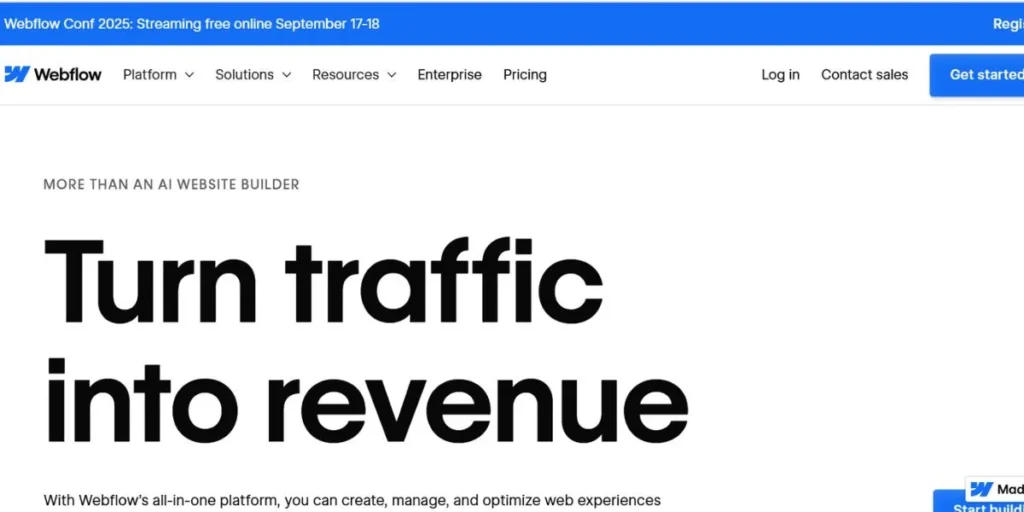
Webflow is an industry-grade web building tool that offers both design liberty and strong development capabilities. Whereas Squarespace alternatives uses templates to create websites, Webflow allows you to edit all elements, so you can have pixel-level accuracy without writing any code. Designers, freelancers, and agencies that desire beautiful and highly personalised websites are particularly fond of it. Webflow allows the transition between design and development with CMS features, responsive design, and animations.
Key Features:
- Visual editor with pixel-perfect customisation.
- Advanced design animations and interactions.
- CMS for blogs and dynamic content.
- Hosting is included with strong performance.
- Collaboration tools for teams.
Pros:
- Total design freedom.
- Professional-grade CMS features.
- Perfect for agencies, designers, and creatives.
Cons:
- Steeper learning curve for beginners.
- Pricing is higher than entry-level builders.
Pricing: Free plan available; Paid plans start at $18/month.
Best For: Designers, freelancers, and agencies looking for complete creative control.
6. Weebly

Weebly, which was recently acquired by Square, is one of the simplest website builders available in the market. Its drag and drop system, clean templates and low cost plans make it suitable for small businesses and individuals just getting started. Although it lacks the polish in design as Squarespace alternatives, it compensates by being simple, having built-in eCommerce features, and connecting to the Square payment system. It is a good starter product at a low cost to the user.
Key Features:
- Drag-and-drop editor.
- Affordable plans with a free option.
- Built-in eCommerce tools (powered by Square).
- SEO and blogging support.
- App Centre for extra features.
Pros:
- Very beginner-friendly.
- Budget-friendly pricing.
- Smooth Square payment integration.
Cons:
- Less design flexibility than Squarespace.
- Limited advanced customisation options.
Pricing: Free plan available; Paid plans start at $10/month.
Best For: Beginners and small businesses seeking a budget-friendly website builder.
7. GoDaddy Website Builder
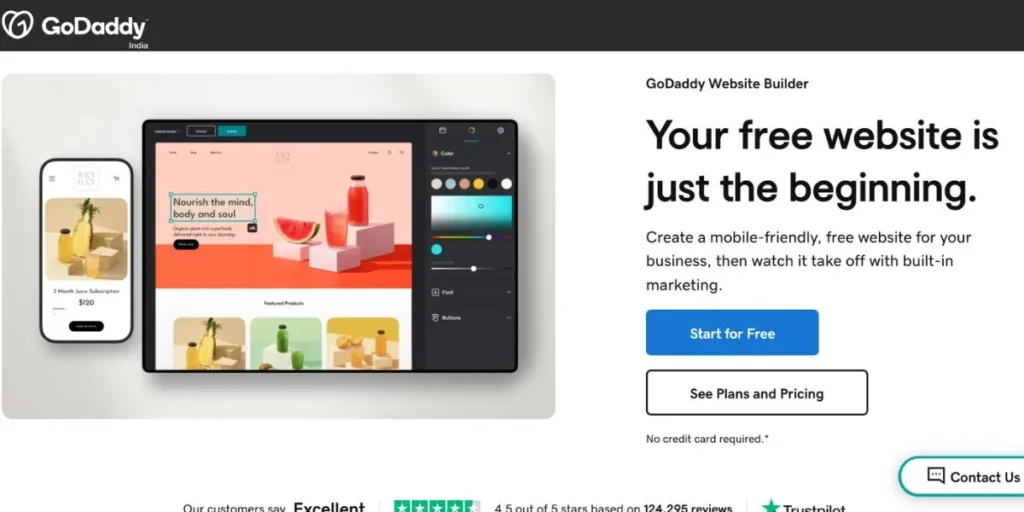
GoDaddy Website Builder is the best option to start a site without thinking much about design. It offers a straightforward all-in-one solution with AI-powered tools, pre-made templates, and in-built marketing functionalities, such as email campaigns and search engine optimization. It is not as powerful a designer as Squarespace alternatives, but it is easier to configure and includes domain, hosting, and business tools in one package.
Key Features:
- AI-driven website builder.
- Ready-made templates.
- Built-in marketing and SEO tools.
- Integration with GoDaddy hosting, domains, and email.
- Social media and appointment booking tools.
Pros:
- Quick and simple setup.
- All-in-one package (domain, hosting, builder).
- Affordable pricing.
Cons:
- Limited design customisation.
- Not ideal for advanced or large websites.
Pricing: Paid plans start at $10.99/month.
Best For: Individuals and small businesses wanting a quick, no-fuss setup.
8. Zyro (by Hostinger)
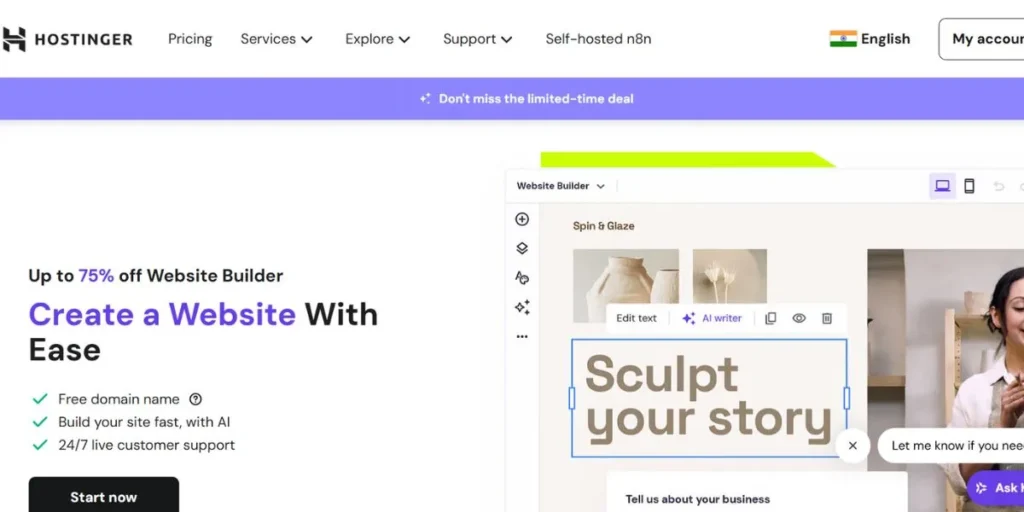
Zyro is a lightweight and affordable site builder supported by Hostinger. It has templates that can be created quickly and are mobile compatible, as well as AI features, such as content generators, heat maps, and logo creators, to assist in making the entire web page creation process a bit faster. It lacks the same design refinement as Squarespace alternatives, but Zyro is cheap and easy to use–much like a freelancer, personal site, or small business trying to get online with minimal expense and effort.
Key Features:
- Modern, responsive templates.
- AI tools (content generator, heatmaps, logo maker).
- Lightweight and fast performance.
- Built-in eCommerce features.
- Affordable hosting bundled with plans.
Pros:
- Very affordable compared to Squarespace.
- AI tools save time in building sites.
- Fast and mobile-optimised.
Cons:
- Fewer features than bigger platforms.
- Limited third-party integrations.
Pricing: Paid plans start at $2.90/month (with hosting).
Best For: Freelancers, personal sites, and small businesses on a budget.
9. Duda

Duda is an agency and a web pro-friendly website builder. It has strong team collaboration capabilities, client management, and white-label solutions that Squarespace alternatives does not provide. Duda is best suited to companies that create and maintain multiple websites on behalf of clients with responsive templates, drag-and-drop editing, and automation capabilities. It is a powerful option when a single project is not enough, and more scalability is required.
Key Features:
- Drag-and-drop website builder.
- Client management and collaboration tools.
- White-label option for agencies.
- Responsive design templates.
- Built-in SEO and widget library.
Pros:
- Great for agencies managing multiple clients.
- White-label branding available.
- Streamlined client communication.
Cons:
- More expensive than most builders.
- Overkill for personal/small projects.
Pricing: Paid plans start at $19/month.
Best For: Agencies, freelancers, and teams managing multiple client websites.
10. BigCommerce

BigCommerce is a high-tech eCommerce platform designed to support business that requires scaling. Whereas Squarespace alternatives suit small shops, BigCommerce operates advanced inventory, global sales and enterprise-level features. It provides easy integrations with big-box marketplaces, multi-channel selling, and effective SEO. BigCommerce is a strong competitor to small to medium businesses desiring to increase their online presence.
Key Features:
- Advanced product and inventory management.
- Multi-channel sales (Amazon, eBay, Facebook, etc.).
- Built-in SEO and marketing tools.
- Highly scalable infrastructure.
- Supports B2B and international sales.
Pros:
- Extremely powerful for large online stores.
- No transaction fees.
- Scales with growing businesses.
Cons:
- Complex setup for beginners.
- Higher pricing than Squarespace.
Pricing: Paid plans start at $29.95/month.
Best For: Medium to large businesses looking for scalable eCommerce solutions.
11. Ghost
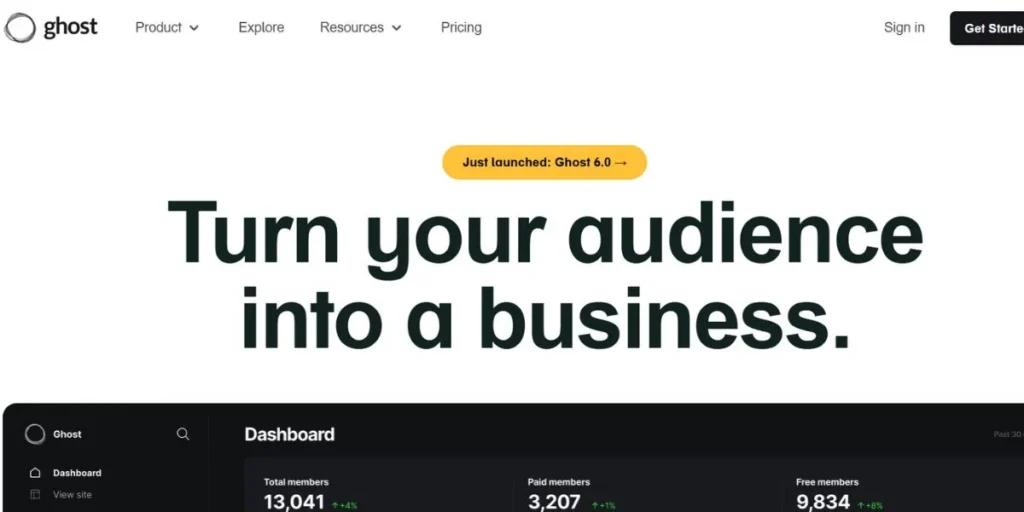
Ghost is a publishing-based tool targeted at writers, bloggers, and content creators. Ghost is a blogging, newsletter, and membership platform, unlike Squarespace alternatives, which is also a general-purpose platform. It provides a distraction-free writing experience, is a fast performer, and has email subscription and monetisation tools built in. Ghost is a minimal but mighty alternative in case you are not primarily interested in building design-heavy sites and prefer to focus on content publishing.
Key Features:
- Minimal, distraction-free writing interface.
- Built-in email newsletter and membership tools.
- Fast performance and SEO-friendly.
- Open-source with customisation options.
- Supports content monetisation.
Pros:
- Excellent for bloggers and writers.
- Lightweight and performance-focused.
- Includes tools for subscriptions and newsletters.
Cons:
- Limited design customisation.
- Not suited for eCommerce or complex websites.
Pricing: Paid plans start at $11/month; an Open-source self-hosted option is also available.
Best For: Bloggers, writers, and content creators focused on publishing and newsletters.
How to Choose the Right Squarespace Alternatives
There is an incredible number of different site builders and platforms, so the best option is the one that fits your requirements, financial status, and future objectives. The following are some of the factors you should consider:
- Ease of use: Brizy, Wix, Weebly, or GoDaddy are easy to deal with and set up.
- In the case of Blogging and Content, select WordPress.org or Ghost, which is a lightweight and writing-oriented platform.
- In the case of e-commerce, choose Shopify when you have a small to medium-sized store, or choose BigCommerce when you demand enterprise-level scalability.
- Design Control: Webflow or Duda are the best choices when you need a truly pixel-accurate customisation, or you are a designer or agency.
- As a Low-Cost Alternative: Brizy, Zyro and Weebly are some of the least expensive providers that do not sacrifice on core capabilities.
- In the case of Agencies and Teams, Duda is designed to work with other teams, clients and to scale up various projects.
The choice of the right options is reduced to aligning your objectives on the websites with the capabilities of the different platforms. Before making a decision, consider your budget, technical capabilities, design requirements and scalability in the long-term.
Pros & Cons of Switching from Squarespace
Pros
- Bigger Customisations: Sites such as WordPress and Webflow provide many more options in terms of design and functionality.
- Stronger eCommerce: Shopify and BigCommerce offer sophisticated online store scaling tools.
- Less expensive options: Brizy, Weebly and Zyro are cheaper to use than Squarespace.
- Wider Integrations: Alternatives have broader app/plugin marketplaces to market to, accept payments, and automate.
- Scalability: Some options expand as your business does, such as simple websites and enterprise applications.
Cons
- Migration Issues: It can be time-consuming to migrate content and design to a different platform than Squarespace.
- Learning Curve: Other options (such as WordPress or Webflow) are more technical.
- Extra Expenses: On self-hosted solutions, you might have to buy hosting, plugins, or themes individually.
- Feature Overlap Confusion: When you have too many features, it becomes difficult to determine the features that you actually require.
- Simplicity Loss: Squarespace is a unified system; competitors will have to use a combination of tools.
Conclusion
Squarespace alternatives is a good website builder, particularly when one desires a stylish template and has everything in a single package. But it’s not the only option. There is a platform that can better meet your needs, whatever they might be: more customisation (WordPress, Webflow), more eCommerce functionality (Shopify, BigCommerce) or a cheaper price point (Brizy, Weebly, Zyro) or content-focused publishing (Ghost).
As long as you know your priorities, budget, and long-term objectives, you can select the appropriate Squarespace option that will not only fit you now but will also expand as you continue to grow.
FAQS
What are the best Squarespace Alternatives in 2026?
The best options are Brizy, Wix, WordPress.org, Shopify, Webflow, Weebly, GoDaddy Website Builder, Zyro, Duda, BigCommerce, and Ghost.
What is the best Squarespace option to use in eCommerce?
Shopify is the best option (small to medium stores). BigCommerce is the better option when dealing with larger businesses that are an enterprise.
What is the best Squarespace alternatives for blogging?
WordPress.org is the best choice when you desire the highest degree of freedom and search engine optimization. Ghost is the best platform to use when it comes to a lightweight and content-focused site.
Do I really need a Squarespace alternative?
Not always. You can continue with Squarespace provided that you are satisfied with the templates, prices, and capabilities. However, when you want to be more flexible, more cost-effective, or have more sophisticated equipment, it is worth considering other options.
 Get 50% off on Vault theme. Limited time offer!
Get 50% off on Vault theme. Limited time offer!